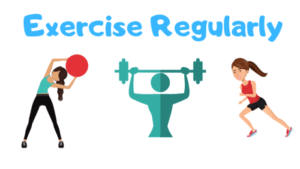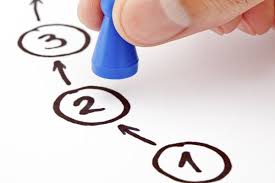If you are one of the millions of people who suffer from ADHD, you know how difficult it can be to cope with everyday life. The symptoms of ADHD can make it difficult to focus on tasks, stay organized, and control your impulses. Fortunately, there are many coping mechanisms that can help you manage your ADHD symptoms. In this blog post, we will discuss 12 effective strategies that can help you live a successful life with ADHD!
Contents
- 1 Defining ADHD
- 2 12 ADHD Coping Mechanisms
- 2.1 Structure Your Environment
- 2.2 Set a Schedule
- 2.3 Exercise Regularly
- 2.4 Practice Meditation
- 2.5 Get Enough Sleep
- 2.6 Break Down Tasks into Smaller Steps
- 2.7 Limit Distractions
- 2.8 Keep a Journal
- 2.9 Find a Creative Outlet
- 2.10 Accept Yourself And Your Limitations
- 2.11 Talk To a Therapist
- 2.12 Stay Calm and Positive
- 3 Conclusion
Defining ADHD
 ADHD is defined as “a common neurobehavioral disorder that begins in childhood and can persist into adulthood.” It is characterized by problems with focus, hyperactivity, and impulsiveness. According to the National Institute of Mental Health, “an estimated 11 percent of children aged four to 17 have ADHD.”
ADHD is defined as “a common neurobehavioral disorder that begins in childhood and can persist into adulthood.” It is characterized by problems with focus, hyperactivity, and impulsiveness. According to the National Institute of Mental Health, “an estimated 11 percent of children aged four to 17 have ADHD.”
There are three types of ADHD:
- Inattentive type,
- Hyperactive-impulsive type
- Combined type
These types are based on the symptoms a person has. In the first type, a person may have symptoms of inattention but not of hyperactivity-impulsivity. In the second type, a person may have symptoms of hyperactivity-impulsivity but not of inattention. In the third type, a person has symptoms of both inattention and hyperactivity-impulsivity.
In simple words, people with inattention have trouble focusing on anything, especially something that requires mental effort. People with hyperactivity-impulsivity may be excessively fidgety and unable to sit still for long periods of time. They may also act without thinking first. A combined type means a person has symptoms of both inattention and hyperactivity-impulsivity.
ADHD can make it hard to do well in school, get along with friends and family, and hold down a job. So, it is important to find ADHD coping mechanisms that work for you.
12 ADHD Coping Mechanisms
ADHD coping mechanisms are different for everyone. Some people with ADHD find that they can’t sit still, while others have trouble concentrating. There are many different ways to cope with ADHD. But these 12 strategies are some of the most effective.
Structure Your Environment
This is the foremost thing to do if you want to cope with ADHD. A cluttered and unorganized environment can make it harder to focus and stay on task. So, take some time to declutter your space. More often, structuring your environment is about getting rid of distractions. This means decluttering your desk, setting up a work schedule, and having a designated space for work and leisure.
Moreover, the environment is not just about your physical space. It also includes the people you spend time with, the music you listen to, and the type of food you eat. So, pay attention to every aspect of your environment and make changes accordingly.
Set a Schedule
A set schedule can help you stay on track and be more productive. In fact, one study showed that people with ADHD who stick to a daily routine are less likely to have symptoms of ADHD. So, try setting a schedule for yourself and see if it helps you stay focused and organized. Make sure to include time for breaks so you don’t get overwhelmed or burned out.
Moreover, try to stick to the same schedule every day so your body and mind get used to it. This can be difficult at first, but it will eventually become second nature. In fact, people with ADHD often find that they work best when they have a set routine.
Exercise Regularly
 Exercising regularly can help to reduce the symptoms of ADHD. It helps to improve concentration, increase energy levels, and improve self-esteem. Exercise can also help to reduce stress and anxiety. Also, it is believed that exercise can help to improve the functioning of the brain. Researchers have found that doing exercise regularly can help to improve the symptoms of ADHD.
Exercising regularly can help to reduce the symptoms of ADHD. It helps to improve concentration, increase energy levels, and improve self-esteem. Exercise can also help to reduce stress and anxiety. Also, it is believed that exercise can help to improve the functioning of the brain. Researchers have found that doing exercise regularly can help to improve the symptoms of ADHD.
There are various types of exercise, for example, running, swimming, and playing tennis. Each type of exercise has its own benefits.
For example, running is a great way to improve your cardiovascular health. It can also help you lose weight and tone your muscles. Swimming is another excellent form of exercise that offers many benefits. It is a great workout for your heart and lungs, and it can also help you lose weight. Similarly, each type has one common benefit – improve your overall health.
So, if you are looking for ways to cope with ADHD, then make sure to exercise regularly. It can help you in more ways than one.
Practice Meditation
Meditation is a form of mindfulness, which has been shown to be helpful for people with ADHD. One study found that after eight weeks of mindfulness meditation training, people with ADHD had fewer symptoms of impulsivity and hyperactivity.
There are many different ways to meditate, so you can find a style that works for you. You can try sitting in silence and focusing on your breath, listening to guided meditation recordings. Some of the meditation examples include:
- Body scan: focus on each part of your body, from your toes to your head
- Sitting meditation: sit with a straight spine and focus on your breath
- Walking meditation: focus on the sensation of each step as you walk slowly
- Lovingkindness meditation: cultivate compassion for yourself and others
So, these meditation tips for people with ADHD can help you focus and feel calmer. Just remember to be patient with yourself and start with a short practice. If you can, meditate for five or ten minutes every day.
Get Enough Sleep
Sleep is considered one of the most important coping mechanisms for people with ADHD. It is essential for people with ADHD to get enough sleep so that they can focus and concentrate on their tasks. A recent study showed that people who slept for eight hours or more per night had significantly lower levels of ADHD symptoms than those who slept for less than eight hours.
In fact, there are several ways that sleep can help people with ADHD. For example, sleep helps to consolidate memories and reduce impulsivity. It also helps to regulate the levels of dopamine in the brain, which is important for attention and focus. So, aim for eight hours of sleep per night and make sure to keep a regular sleep schedule.
Break Down Tasks into Smaller Steps
 It is essential to break down big projects into more manageable tasks when you have ADHD. When a project seems insurmountable, it can be helpful to create a to-do list of all the individual steps needed to complete it. This will make the project feel less daunting and will help you stay on track.
It is essential to break down big projects into more manageable tasks when you have ADHD. When a project seems insurmountable, it can be helpful to create a to-do list of all the individual steps needed to complete it. This will make the project feel less daunting and will help you stay on track.
In addition, breaking down tasks into smaller steps can help you to better focus on each individual task and avoid getting overwhelmed. This is especially important when working on complex or challenging tasks.
Limit Distractions
People with ADHD are easily distracted by their surroundings so you need to distract yourself to improve your focus. If you’re easily distracted, it’s going to be very hard for you to stay on task and get things done. There are a few things you can do to limit distractions:
- First, try to work in a quiet environment if possible. If you can’t find a quiet place, try using noise-canceling headphones or earplugs to help block out distractions.
- Second, turn off any electronic devices that might distract you. This includes things like your phone, computer, TV, and so on. If you need to have these things on in order to do your work, try to set them up so that you can’t see or hear them.
- Finally, try to limit the number of people around you. If possible, work alone or in a small group. Having too many people around can be very distracting.
If you can limit distractions, you’ll find it much easier to focus on your work and get things done.
Keep a Journal
Journals are a great way to get all of your thoughts and feelings out. You can write about whatever is on your mind, and it can be a great way to vent. Journals can also help you track your progress and see how far you’ve come.
Start a gratitude journal, where you write down things that you’re grateful for each day. This can help shift your focus from negative to positive thoughts.
You could also try a bullet journal, which is a type of journal that helps you track and organize your thoughts and tasks. Bullet journals can be customized to fit your needs, and they can be a great way to stay on top of things.
Find a Creative Outlet
 Creative outlets can be a great way to express yourself and can also be very therapeutic. Some creative outlets that may help you include:
Creative outlets can be a great way to express yourself and can also be very therapeutic. Some creative outlets that may help you include:
- Writing
- Drawing
- Painting
- Sculpting
- Photography
Find something that you enjoy doing and stick with it. It doesn’t have to be perfect, just let your creativity flow. Moreover, creativity can also help improve your focus and concentration. When you choose some creative outlet you will more likely to succeed because you can do what you love. Also, it is a good way to relieve stress and tension.
Some people choose art as their creative outlet while others may choose music or writing. It doesn’t matter what you choose as long as it is something that you are passionate about and that brings you joy.
Accept Yourself And Your Limitations
When you are first diagnosed with ADHD, it can be hard to accept. After all, you are now dealing with a lifelong condition that will require management. It is important to remember that you are not alone. Many people live with ADHD and lead successful lives.
One of the most important things you can do is to accept yourself and your limitations. This doesn’t mean that you should give up on your dreams or stop trying to improve yourself. It does mean that you need to be realistic about what you can and cannot do.
Don’t be too hard on yourself. You are doing the best you can. Remember that your ADHD is not your fault. It is a condition that you have no control over. With understanding and acceptance, you can learn to manage your ADHD and live a happy, fulfilling life.
Talk To a Therapist
Therapies are often short-term but can help you long-term. There are several types of therapy that can be helpful, but the most common for people with ADHD is cognitive-behavioral therapy (CBT). CBT helps you learn how to manage your thoughts and behaviors. It can also help you understand how your ADHD affects your life and relationships.
A therapist can also help you come up with coping mechanisms that work for you. They can help you understand your triggers and how to avoid them. Therapists can also teach you how to manage your time, set goals, and stay organized.
If you’re not sure where to start, consider Mantra Care. Mantra Care offers online therapies for people with ADHD. Also, the team of experts can help you to choose the right type of therapy for you. You can book your free consultation today to learn more!
Stay Calm and Positive
 It is difficult to think straight when you feel like the world is against you. When someone with ADHD feels this way, it is important to try and stay calm and positive. This can be difficult, but it is worth it to try and see the good in every situation. In fact, research has shown that people with ADHD who stay positive are more likely to succeed in life.
It is difficult to think straight when you feel like the world is against you. When someone with ADHD feels this way, it is important to try and stay calm and positive. This can be difficult, but it is worth it to try and see the good in every situation. In fact, research has shown that people with ADHD who stay positive are more likely to succeed in life.
So, these are some of the coping mechanisms that actually work for people with ADHD. It is important for you to understand that everyone is different, so what works for one person might not work for another. However, if you can find the coping mechanisms that work best for you, it will make living with ADHD a lot easier.
Conclusion
To conclude, ADHD coping mechanisms are important for those who suffer from the condition. By utilizing these coping mechanisms, you can help yourself or your child better manage the symptoms of ADHD. Remember to be patient and try different techniques until you find what works best for you or your child. Do not get discouraged if one method does not work. As there are many options available.
With a little trial and error, you will find the perfect coping mechanism or combination of mechanisms that work for you or your child. Be patient and stay positive as you explore different options. You will find what works best eventually.
For more information, please contact MantraCare. ADHD is a neurodevelopmental disorder characterized by difficulty in paying attention, hyperactivity, and impulsivity. If you have any queries regarding Online ADHD Counseling experienced therapists at MantraCare can help: Book a trial ADHD therapy session


